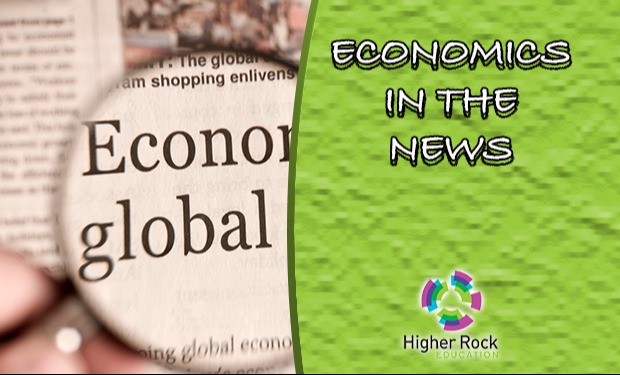
Economics in the News – Dec. 9-15, 2024
Economics impacts our lives every day. Below are some of the top storylines from this past week related to economics.
o Bill Belichick – the eight-time Super Bowl Champion and the second-winningest coach in NFL history – was tabbed the head football coach at University of North Carolina. As rumors of Belichick’s interest in the job swirled, clothing stores and brands were eyeing their next clothing line for fans.
BreakingT, a clothing apparel company specializing in viral moments, introduced a “Chapel Bill” slogan, a play on the school’s location in Chapel Hill, N.C. A local store in Chapel Hill, Shrunken Head Boutique, made a play on Belichick’s signature look on the sidelines – a cutoff hoodie. The store was able to turnaround the hoodies for customers in time for Belichick’s introductory press conference, where he was formally introduced as the head coach of the Tar Heels. [The New York Times]
o A move that could help save Americans billions of dollars in fees was approved by the Consumer Financial Protection Bureau. It would limit overdraft charges at large banks and credit unions, capping the fees customers are charged when they spend more money than they have in their bank accounts. The average overdraft fee is around $30, according to Bankrate. It is unclear whether the proposed change would remain in place once President-elect Donald Trump returns to the White House. It is scheduled to take effect in October 2025.
Large banks would have several options to comply. They could set their overdraft fees at $5, or set their fees at another amount that covers their costs and losses. Another option would be to treat overdraft fees as a line of credit and provide similar disclosures, including applicable interest rates. The rule would apply to banks with more than $10 billion in assets which includes about 150 of the nation’s 9,000 banks and credit unions. [The New York Times]
o Business executives are lobbying President-elect Donald Trump to soften or alter his trade policies, including the steep tariffs promised on imports from China, Canada, Mexico and other countries. With Inauguration Day less than two months away, companies based in the United States and globally are weighing the idea that Trump will follow through on his plans.
Economists and executives warn that if Trump does follow through that it could trigger a trade war that economists state would increase prices for consumers, as it would raise the costs for US-based businesses that import products from abroad. Some companies and Republicans are hoping that Trump’s promises to impose stiff tariffs won’t translate into action because they are being used as a negotiating tactic to extract concessions from other countries. [The Wall Street Journal]
o As the New Year approaches, 2025 could be an impactful year for a new wave of obesity-treatment drugs. Two companies have dominated the obesity treatment market – Denmark’s Novo Nordisk A/S and Eli Lilly & Co. Ozempic and Wegovy. Results from dozens of midstage patient trials of medications for obesity and related diseases are due in 2025.
The data will help determine available options in coming years, as drugmakers are looking to offer medicines that can be taken less frequently, spur greater weight loss or cause fewer side effects. The market could approach $50 billion annually, according to Bloomberg Intelligence. [Bloomberg]
o Have you started your Christmas shopping or seeking last minute deals? Time is running out to ensure that the gifts you buy for loved ones arrive in time for Christmas. Mail carriers have made preparations for the busiest time of year.
The United States postal service advises sending out items earlier, but for items to arrive in time for Christmas morning, they should be mailed by Dec. 21. Meanwhile the USPS warns that an ongoing strike by the Canadian Union of Postal Workers could delay packages sent to Canada. FedEx and UPS say that customers can use their next day service, and shipments can be sent as late as Dec. 23 to ensure arrival by Dec. 25. [NPR]